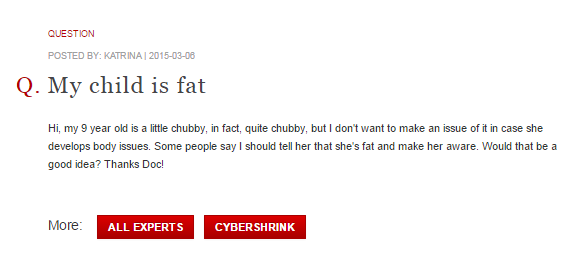
Children today are larger than ever. As parents we go out of our way to prevent them from feeling concerned about their weight, but could this behaviour actually be irresponsible? Are we teaching our children that obesity and its associated health complications don’t matter? Are we, as parents, fuelling the global obesity epidemic?
British columnist and TV personality Katie Hopkins thinks so. Katie is well-known for her outspoken views on obesity and often openly mocks celebrities’ weight on Twitter and in television interviews.
In 2013, she caused quite a stir by stating that she would never hire an obese person. She has also previously claimed that she hates fat people and that they are all lazy.
She later purposefully put on 3.5 stone (approximately 22 kg) and then lost it to show that obese people can diet successfully.
The entire experiment was then aired as a television show called My Fat Story.
American Idol winner Kelly Clarkson is the latest victim of Katie's Twitter attacks. Katie slammed Kelly is a series of tweets stating that she cannot use "baby weight" as an excuse a year after giving birth.
Read: Today's parents blind to kids' obesity
Look chubsters, Kelly Clarkson had a baby a year ago. That is no longer baby weight. That is carrot cake weight. Get over yourselves.
— Katie Hopkins (@KTHopkins) March 3, 2015Katie believes that we should stop sugar-coating the truth when it comes to weight and obesity. In a 2013 appearance on iTV's This Morning, Katie stated that we need to stop "wrapping people in cotton wool". She says that parents should sit down with their children and tell them, "We've created a problem here, you're fat."
While, her approach is certainly controversial and extremely offensive to many, is there some method to her madness?
Is obesity really okay?
No, its not. It's not about beauty, beauty comes in all shapes and sizes but unfortunately, health does not. Obesity is a health issue not an aesthetic issue and we need to recognise and acknowledge that.
South Africa is among many nations facing an increasing obesity epidemic. According to the South African Medical Research Council (MRC), 17% of South African children between the ages of 1 and 9 living in rural areas are overweight. Further research from the MRC indicates that 70% of women over the age of 35 are overweight or obese.
These figures show that there is something drastically wrong with our lifestyle.
As the prevalence of obesity increases, so does the prevalence of related diseases such as type 2 diabetes, hypertension and stroke. By protecting our children from knowing the consequences of being overweight or obese, we are actually lining them up to continue with the poor lifestyle choices that lead to these life-threatening conditions.
Read: Childhood obesity brings future health problems
But is calling them "fat" the best way to go about it?
No, of course it isn't. Calling your child fat or taunting them about their weight is obviously going to have a negative psychological effect. No parent wants to be responsible for causing self esteem issues or eating disorders but this doesn't mean we should pretend that weight issues don't exist.
Talking about weight doesn't have to be mean. If you're child has valid concerns about their weight, there is no benefit in denying them. Instead you can acknowledge their concerns and help them to become healthier.
Recently, a reader asked Health24's Cybershrink whether or not it is a good idea to make her 9 year old daughter "aware" that she is overweight.

Cybershrink explains that a 9 year old child will already be aware that he or she is overweight. He says, that as a parent you should do the following:
"First, think through the realities yourself : consider her diet and the amount of exercise she gets, and how each might be improved. Then have a calm and friendly chat with her, about how she feels about becoming a bit over-weight and how you can help her to deal with this, by improving the diet you both share, and improving the amount of exercise you both get."
Explain to them how sugary, high-carb foods affect our weight and how exercise helps use to regulate our weight. Teach your children about moderation. It's OK to enjoy a chocolate now and then but balance is key. Implement a "Treat Day" for the family where everyone eats healthily in the week but on a Sunday you all go to the beach and enjoy an ice-cream together.
If the whole family is making a change towards a healthier lifestyle, your overweight child won't have to feel different or isolated from their siblings.
It is not about making children fear being overweight; it is about teaching them to have a good relationship with food in order to live a long, happy and healthy life.
Read more:
Is technology causing obesity and diabetes?




 Publications
Publications
 Partners
Partners










